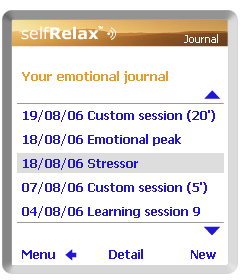Write your stress down
Did you know that keeping a "stress journal" can actually
contribute to lowering your stress level,
sometimes significantly? It has been very seriously evaluated by medical
studies and proven to
have a durable impact on stress (for instance, a study
from the University of Iowa published in the August
2002 issue of the Annals of Behavioral Medicine).
So, what is it? Do you just have to write "It is 4 pm
and I feel very stressed" to immediately feel better?
Of course not. There are a few principles to follow.
The whole point is to help you step back from the
causes of your stress (your stressors), the way you
feel when you face them (your emotions), and the
way you react (your behavior). Making the effort to
put words on these 3 key components of stress
automatically puts some distance between you
and them, making them look more familiar, less
threatening the next time you find yourself in a
similar situation. Little by little, you get to feel safer
about them, more in control. You become more
relaxed about stress, thus making it gradually decrease or even disappear.
It is particularly useful when a mental professional can help you
analyse and "re-process" your
journal, clearing up false ideas or revealing things you had not seen
to help you move forward.
But even alone, journaling is a wonderful tool to help you better
understand yourself and the world.
So here is how it works. SelfRelax allows you to write 3 different types of "notes" or "logs":
- Emotional peak
When you experience an emotion (preferably a significant one), open a new "emotional
peak" form and answer the following questions:
- Which emotion is it (stress, fear, sadness, anger...)?
- How "intense" is it (from 0 to 5)?
- What is the cause?
- How did you react?
- What do you think would have been a "better option", i.e. a more appropriate reaction?
- Stressor
When you notice that something in particular is a lasting cause of stress for you,
open a new "stressor" form and answer the following questions:
- Which stressor is it (work, family, neighbor, money...)?
- How "intense" is your stress (from 0 to 5)?
- What exactly makes you stress about it?
- What can you do to cope with it?
- Free note
If you want to write something that doesn't fit the previous forms, add a new "free note",
give it a title, and write just what makes you feel good.
This journal can also be used in pain management ("emotion"
= "sensation of pain" and
"stressor" = "pain factor").
